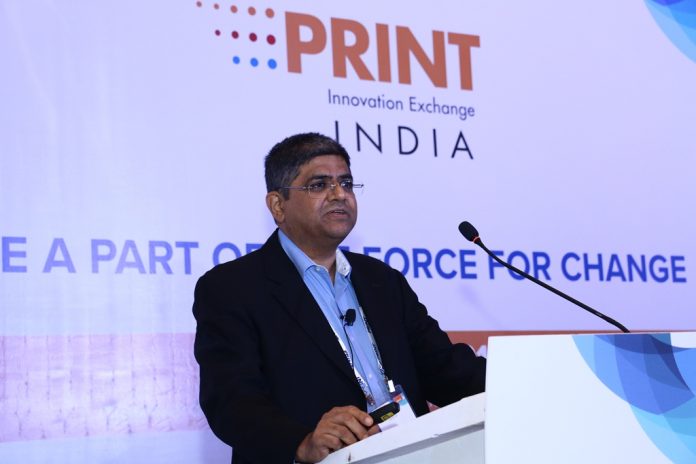The Indian print industry needs to change and reinvent its business model. It has to accept that selling ink on paper is not enough, Bimal Mehta, managing director of Vakils Premedia, said during the Print Innovation Exchange India 2019 Conference that was held in Mumbai on 25 November.
“It is time printers need to realize that selling just ink on paper is not going to suffice. Printers who keep selling print and nothing else will struggle to survive. Printing companies should no longer be seen as commodity suppliers and instead present themselves as solutions providers,” Mehta said.
Vakils Premedia, a part of printing and publishing company Vakil and Sons, is a shining example of how a traditional print company can evolve with the times, adapt to the latest trends and continue to thrive and grow. Vakils Premedia offers services such as artwork production, design adaptation, image editing, design, and composition of books, journals, and financial reports to name just a few. It enables various content owners like publishers and enterprises to plan, manage, purpose, and deploy their content across multiple media platforms like print, web, mobile, social, and interactive. It has been delivering these services to customers spread across Australia, Europe, the US, UK, and India.
The need to change
According to Mehta, printers need to start selling more evolved services to their clients. Many printers already have some value-added services, such as design and logistics. “This is not enough; we need to go beyond this. Printers need to design their action plan to create value-added services,” he argued.
As per Mehta, the action plan could include asking customers the kind of challenges they are facing, creating a service offering that addresses these specific issues and developing a sales message that focuses on services that one can offer.
Digital trends in communication and marketing
The role of data has been increasing in a customer’s journey and helps service providers to connect with them at the right time. Many service providers, including printers, can use data to serve their customers well.
Mehta said that data-driven marketing helps in focussing on individuals, and thus optimizing the customer experience. He said that service providers should reach out to and understand mobile customers. Giving an example of web-to-print, he said, “offering print products via online storefronts helps in increasing efficiencies.”
Some case studies from the print world
During the concluding portion of his presentation, Mehta talked about printing companies from across the globe who have used technology and innovated to remain relevant.
He talked about LSC Communications, an American multinational commercial printing company based in Chicago. The company was established in 2016 as part of a corporate spin-off from RR Donnelley and now owns the publishers Research & Education Association and Dover Publications. The company offers a host of services such as printing of magazines, books, and catalogs, among others. It also offers LSC Suite, which is a multi-channel digital platform. The company also provides warehousing, fulfillment, postal distribution, and optimization services as well as print management services.
Mehta also cited the example of Boston-based book printing firm King Printing, which prints books for schools and colleges. They use powerful web-to-print software to service their customers. “King Printing is a classic example of how technology and print have married to provide a solution which has worked for the publisher,” he said.
Closer home, he talked about Mumbai-based Printstop, which has also used technology very efficiently and offers web-to-print services. With a heavy focus on technology, ethics, and agility, Printstop has achieved significant growth since its inception in 2007. Printstop currently caters to the stationary, marketing collateral, and print-on-demand segments. It has implemented a hub and spoke model.
















